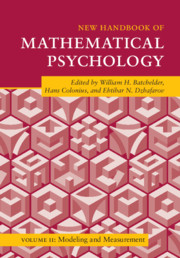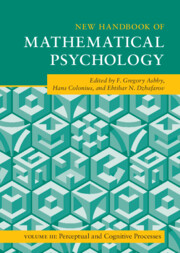New Handbook of Mathematical Psychology
The field of mathematical psychology began in the 1950s and includes both psychological theorizing, in which mathematics plays a key role, and applied mathematics motivated by substantive problems in psychology. Central to its success was the publication of the first Handbook of Mathematical Psychology in the 1960s. The psychological sciences have since expanded to include new areas of research, and significant advances have been made in both traditional psychological domains and in the applications of the computational sciences to psychology. Upholding the rigor of the original Handbook, the New Handbook of Mathematical Psychology reflects the current state of the field by exploring the mathematical and computational foundations of new developments over the last half-century. The second volume focuses on areas of mathematics that are used in constructing models of cognitive phenomena and decision making, and on the role of measurement in psychology.
- Demonstrates how standard advanced mathematics can play an essential role in the psychological sciences
- Focuses on mathematical foundations rather than specific empirical studies
- Aims to increase the sophistication of students and scholars in mathematical psychology and related fields in the behavioral and social sciences, mathematics, economics, and analytic philosophy
Reviews & endorsements
'This Handbook contains review articles by leaders of the field. It will be a valuable reference for all who are interested in mathematical psychology.' Brian Skyrms, University of California, Irvine
'This volume is the second in a series devoted to presenting a very readable, yet broad and deep, up-to-date perspective on mathematical psychology. It will be of interest to graduate students and experienced researchers who are concerned with modeling and measurement in the psychological and cognitive sciences.' Thomas S. Wallsten, University of Maryland
'These two volumes are a valuable contribution to mathematical psychology; partly representing important summaries of special branches, partly pushing the forefront of research towards new horizons. They should be read by all working in special fields, but also by students who are striving for a general point of view. We are looking forward to the third volume.' Reinhard Suck, Journal of Mathematical Psychology
Product details
September 2018Hardback
9781107029071
474 pages
253 × 178 × 26 mm
1.1kg
Available
Table of Contents
- 1. Stochastic methods for modeling decision making Adele Diederich and Keivan Mallahi-kara
- 2. The diffusion model of speeded choice, from a rational perspective Matt Jones
- 3. Stochastic foundations of elementary mental architectures Joseph W. Haupt, James T. Townsend and Brett Jefferson
- 4. Identifiability of probabilistic models, with examples from knowledge structure theory Jean-Paul Doignon, Jurgen Heller and Luca Stefanutti
- 5. Quantum models of cognition and decision Jerome R. Busemeyer and Peter D. Kvam
- 6. Computational cognitive neuroscience F. Gregory Ashby
- 7. Discovering aggregation properties via voting Donald G. Saari
- 8. Categorization based on similarity and features: the Reproducing Kernel Banach Space (RKBS) approach Jun Zhang and Haizhang Zhang
- 9. The axiom of meaningfulness in science and geometry Jean-Claude Falmagne, Louis Narens and Christopher Doble.








